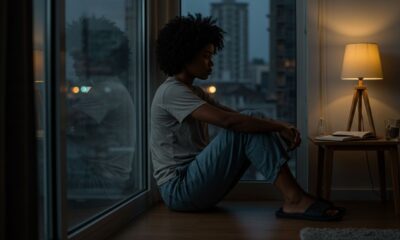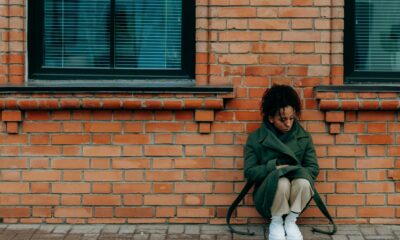Features
BN Prose: Conversations with God by Dika Ofoma
When Chinazaekpere beats her child, The Girl does not cry, she only murmurs. So when The Girl grows up and becomes wayward, she blames herself for not beating her enough. The Girl is pregnant and says she does not know who helped put the bastard in her. Chinazaekpere slaps her ten times and rubs ground pepper in her armpit and vagina to see if it will help her remember. But The Girl just murmurs, she doesn’t even honour Chinazaekpere with a crocodile tear and this upsets and tempts Chinazaekpere to rub some of the pepper in her eyes.
Chinazaekpere learns to cover her face, bend her head, and pretend not to notice the eyes of her fellow women judging her for being a bad mother whenever her daughter accompanies her to the market. There are times she wants to shout at them, tell them all the times she’s seen their daughters under the bodies of good for nothing men in the bushes and also tell them that it is only a matter of time before their daughters too waddle the market, carrying the weight of babies whose fathers they would be too ashamed to voice.
However, in her heart of hearts, she doubts the possibility of this. She knows that these daughters of her fellow women have learned how to eat and wipe their mouths clean – they were not stupid like her own daughter.
When The Girl births her own daughter, Chinazaekpere names The Little Girl, Chinyerenwa because, after all, it is God that gives children. The Little Girl is taught to call her grandmother; mother, and her mother; Sister Chinonyelum, because teaching her the right thing will birth questions neither Chinazaekpere nor her daughter is prepared to answer or know how to answer.
The rain comes and goes, the harmattan yellows the leaves of the tree in Chinazaekpere’s compound and later burns them brown and they fall from the tree. Then the rain returns and the tree bears oranges. When The Little Girl smiles now, eight teeth glisten in the cave of her mouth. This is when Chinazaekpere begins to notice that her daughter’s breasts have begun to grow bigger like the last time and the cloth pieces she uses to stop her flow from soiling her wrappers have remained clean and untouched in her akpati.
Chinazaekpere doesn’t say a word to her but she also refuses to let her bring shame on her again. So she slaps her ten times and gives her some herbs to chew. The Girl chews the herbs and after some time, she groans and rolls on the floor as blood clots and flowing blood streams down her legs like sweat running down a bent back on a farm. Weeks later, she resumes using the cloth pieces that holds her flow.
Chinazaekpere pulls her daughter’s ear and inside it, she warns her to keep her legs closed, that no man would want a wife who has already raised a community in her mother’s home. But The Girl does not listen, or maybe she tried but couldn’t. She starts to open her legs again once the pain from the pulled ear wears off. When her flow stops again, she runs to her mother and begs her for the herbs. Her mother slaps her ten times and chases her away from her home, telling her that she will not allow herself be tainted again because of her or have to hide her face again at the marketplace because of her stupidity and waywardness.
Chinazaekpere learns from her mistakes and raises The Little Girl with a harder hand – never failing to use her koboko, to slap her ten times and pull her ears whenever the need arose, and she would not stop until the little girl screams and has cried her eyes out. She also teaches The Little Girl to keep her legs closed at all times, to distance herself from boys, not to let them touch her because if she did, God would hate her and send her to hell where she’d burn and burn but would never be burnt.
The Girl
Chinonyelum soon returns carrying a Ghana–Must–Go and a tale about a son who had died at infancy. She scrapes her knee on the stony ground, crying and begging and The Mother does not have the heart not to forgive her. The Mother lifts her up but refuses a hug from her, she looks at the orange tree instead. It’s harmattan again. The Mother watches the yellowed leaves fall and tries to fight the tears forming but she’s not strong enough. They defeat her and as though mocking her, they rain in torrents. She turns to Chinonyelum and slaps her – just one slap. But for the first time, Chinonyelum cries. Still, she moves closer to The Mother, The Mother is too weak to resist the hug this time. They hug, arms holding tight to the other’s body, each lending the other a shoulder and they both let their tears fall on it.
Chinonyelum is no longer the Chinonyelum that she was. She has changed in the way only grief can change people. She thinks deeper about life now and believes she exists for a cause. She also covers her hair often now and prays, and deprives herself of food and water for long hours during the day; it’s her way of seeking redemption from God. She walks five kilometers to church every day to kneel before the image of the hung Christ and beg it for forgiveness. She forgets that she has a child to cater for and this makes The Mother slap her ten times and raise her voice at her.
But Chinonyelum only sees The Mother as the opposition her dog-eared and almost spineless Bible foretold and warned her about. And so, she does not murmur or cry but turns the other cheek for The Mother to slap ten times too. Sometimes, she throws her head back and laughs and tells The Mother that even Jesus was persecuted and that her faith is unshakable. Even when The Mother threatened to send her away if she does not try to be responsible for The Little Girl, Chinonyelum’s faith remained unshakable and she continued to walk five kilometers to kneel before the image of the hung Christ.
When The Man of God who runs the church for God notices her devotion to and adoration of the hung Christ, he recommends her to one of the big men who return to the village to seek wives because the eyes of city girls are too open, have seen many things and were thus, not wife material. The Big Man sees her covered head, bare ears, and oversized clothes, and agrees she’s a good fit for a wife. This is the sign Chinonyelum had been looking for to confirm if God had truly forgiven her. She sings and dances and The Mother is the happiest woman on earth. The Big Man buys The Mother wrappers and promises to buy her more wrappers. The Mother is too joyed that her belly can’t contain it and it spills. She shouts! And when an ear stops to know why she is shouting, she tells the ear that this is the dividend of having a well home trained daughter. Her words travel and reach the wrong ears and the rumour begins to spread.
“Is it true that you were prostituting yourself all over the city?” The big man asks Chinonyelum on a sunny Sunday out of nowhere, like lightning in a blue sky. Chinonyelum holds her chest, she knows this is her death. Still, she manages to convince the big man to ignore the talks of the villagers because it is only fueled by jealousy. But when he asks who really is the mother of The Little Girl, Chinonyelum is not prepared. She has not hardened her heart enough to look him in the eye and deny her child. The Big Man zooms off and Chinonyelum would forever remember the taste and smell of the cloud of dust his car left behind. Other big men and sometimes small men knock on her door but the rumour also chases them away until Chinonyelum’s time is up, and the big men and small men that now knock, knock not for her, but for The Little Girl.
The Little Girl
When Chinyerenwa is grown, she learns from the rumour that her grandmother is not her mother but her grandmother and her sister is not her sister but her mother. She’s not angry for being lied to but she’d come to feel a void open and fill her up and there will be many nights of feeding her pillow with tears.
Chinyerenwa decides to empty this void and so asks her mother who her father is. Her mother looks into the fire, she does not mind the smoke, it stings her eye and they redden and form tears. Chinyerenwa doesn’t care that her mother is crying, she grabs the knife her mother was using to cut yams and brings it close to her own neck and says: “This life doesn’t sweet me anymore. Tell me who he is or I’ll go and rest.”
Her mother believes her and gives her a name and tells her where to find the man who answers to it. She goes in search of him. When she finds him, the void expands and fills up instead of empty. She finds that the man is not the kind one can boldly call ‘father’ at the marketplace. She returns home and lays her head on her grandmother’s lap and soaks her wrapper with her tears. Her grandmother caresses her hair and tells her that just because she doesn’t have what other people have doesn’t mean she’s a lesser human.
Because when a finger collects oil, it is enough to soil all the other fingers. The rumour also chases Chinyerenwa’s suitors away. And so the first man who deafens his ears to the rumour and says he doesn’t care what her mother did or did not do, Chinyerenwa is grateful and agrees to marry him. Her people are also grateful and so the list for her marriage rites does not fill up pages nor does her bride price empty the man’s pocket.
Chinyerenwa thinks that marriage will empty the void because she’s finally a woman with a man. She feels this makes her complete. The void is however stubborn and refuses to empty. When she becomes heavy with a child, she packs her belongings and returns to her grandmother’s home.
This sparks another rumour in the village. The rumour says that there’s a curse following her grandmother which also followed her mother and now her and will also follow her unborn child. The rumour explains why her grandfather died while her grandmother was still pregnant for her mother and why her mother never got married and why she has run away from her husband’s home. In a nutshell, the rumour says that they’ve been cursed to be women without men of their own. Chinyerenwa doesn’t believe the rumour and thinks it stupid. But when she births a daughter instead of a son the scan she had promised her, she begins to fear that perhaps, they are really cursed.
Chinyerenwa christens the baby, Chizobam because she wants God to save her. She doesn’t borrow her grandmother’s leaf in the way she was raised. She raises her daughter differently. She uses the koboko of course, but unlike her grandmother, she also knows when not to use it. She makes herself a spring and the baby comes to her drinking up all she needs to be full, complete and unto herself. She hopes this expels the curse from the baby. However, she also knows that only Chizobam’s Chi knows what she’ll become. And this is why when she listens to her grandmother’s stories of all the women who stayed and survived; women who survived the blows, the black eyes, and the broken lips, she returns to her husband and is pregnant again. She names the unborn child, Chikamneleanya. It is God that I am looking at.
The Little Girl, The Girl, and The Mother
The little girl is no longer a girl but a mother and she mothers her daughters the way she wished she had been mothered. Yes, daughters. The unborn child has been born and she bears the name she’d been given before her birth, Chikamneleanya. Chinyerenwa is however tired of looking at God and decides to take matters in her hands. She’s tired of the blows, the kicks, the slaps, and she decides she no longer wants to survive them. She doesn’t want to survive. She wants to live, and so she leaves to live. She carries her children; one strapped to her back, the other clutching her finger. She ensures she spat on the man’s face before she leaves. It is a poor attempt at being vindictive. What is a mint smelling spit to three years of torture and abuse? Perhaps if she’d left her mouth fouling for three years, its worth and stink may have done lasting harm to the man she once called husband.
She doesn’t return to her grandmother or her mother this time. She also doesn’t think much of the curse anymore. What use is a curse if it’s indeed a blessing?
She shambles her way through streets not knowing where she’s headed, the weight of her daughters weighs her down but she does not let up. She shambles and shambles until she finds a shack. She pays for it and calls it home. Before the cock crows, she’s up, sitted on a stool in front of the shack, akara sizzling in a pan before her. When the cock crows, humans encircle her and when the cock has crowed, they’ve bought up all the akara. She does this tomorrow and the day after and before she knows it, it’s a year. This is how she pays her daughters’ fees, puts ribbons on their hair and ensures that they do not starve.
Soon the girls are grown and they inquire from her – just as she had done with her mother – who their father is. She tells them that he’s a man who did not bat an eyelid about them when she took them with her when fleeing whatever it was they called marriage and had gone on to marry a woman who would prove him a man by bearing him three sons. What a fit! The girls rub her hands and pat her back and stop the tears from falling. They say who needs a father when they have both father and mother in one. She corrects them. She insists that she’s just a mother and being just a mother is enough.
The girls do not cause her much heartache anymore. She enjoys and endures their lunacies. After all, girls will be girls. She remembers her intentions with Chizoba and she extends it to Chikamneleanya. Still, when she’s grey and wrinkled and is ridden in her sickbed which soon becomes her deathbed, she fears that perhaps she had not done enough; that the girls were not women enough yet. With death approaching and its smell pungent and suffocating, she’s reminded of the curse and she fears for her girls. She wants to believe that cutting off her grandmother and mother may have broken the chain of the curse. However, before she takes her last breath, she tells the girls about the curse and in a bid to lessen their fears she tells them that a curse is only a curse if you believe it. She, however, hopes that even if the curse haunts them, she’s prepared them, raised them to be full women who would not need a man or anyone else to feel complete and human.




















